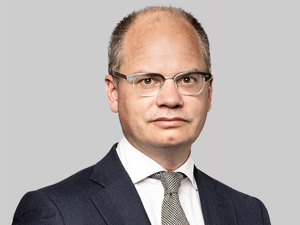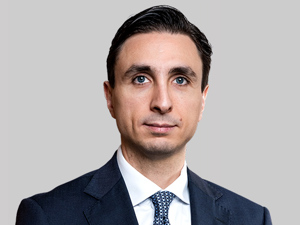Q4 provided a strong finish to the year, with the fund returning 6.3%, significantly outperforming the index return of 4.6%. For the full year, the fund delivered a robust absolute return of 30.9%, compared to the benchmark's 33%. The main driver during the quarter, and to some extent the full year, was our exposure to the memory sector in Korea and Taiwan, while we also generated strong alpha in India.
2025 was a standout year for emerging markets. Shrugging off trade wars, they outperformed the S&P 500 by 16.5%, making their strongest relative performance since 2008. This was driven by a weakening USD, investor concerns about over-concentration in the US and strong country-specific drivers. China, the largest market, surged by 31% on the “Deep Seek” moment, when the world realised that China could compete in AI, potentially in a more cost-efficient way than US hyperscalers. We believe that Chinese technological prowess remains underappreciated in the West, not only in AI, but also in areas such as electric vehicles (EVs), renewable energy and both industrial and humanoid robotics. Consequently, we expect this theme will be a primary catalyst for Chinese and, by extension, emerging market returns for many years to come. Our current Chinese holdings are focussed on these themes. For example, we hold shares in Hesai, a leading LiDAR producer, which was recently announced as the sole provider for Nvidia’s DRIVE AGX Hyperion 10 platform, a system designed for Level 4 autonomous driving.
On an absolute basis, Korea was the top-performing market, with the MSCI Korea index returning over 100% in the year, while the broader, and more diversified KOSPI index gained 83%. This was largely driven by the large memory stocks in the index, Samsung and SK Hynix, which returned 130% and 278% respectively, during in the year. We became increasingly positive on the memory cycle during the year, which was reflected in our positioning in terms of selling out of Samsung and buying Hynix and its holding company, SK Square. Essentially, demand for memory from AI data centres is vastly outstripping potential supply, not to mention the additional demand from other sources such as computers and phones. As a result, these companies have been able to consistently raise prices for their memory chips. Consensus currently expects SK Hynix to increase server DRAM prices by 60-70% quarter-on-quarter in Q1 2026. This is driving a wave of earnings upgrades and leaving these stocks attractively valued. SK Hynix is currently trading at a 8.4x P/E for 2026, compared to Nvidia’s 21.4x P/E, despite comparable earnings growth and margins. We believe these earnings upgrades will continue and therefore see memory names will remain a key theme for us in 2026.
India took a breather in 2025, returning just 4% for the year. This was driven by a combination of factors, including challenging geopolitics, a cyclical slowdown, elevated valuations and limited AI exposure. H1 2025 was challenging for us from an alpha perspective in India, as many of our mid-cap stocks sold off strongly after an extremely strong run in 2024. However, relative performance improved significantly in H2, with 1.9% of alpha in Q4 alone. In Q4 Mitsubishi UFJ Financial Group announced that it would acquire a 20% stake in our largest holding, Shriram Finance, for USD 4.4 billion, marking the largest ever international investment in an Indian financial services company. We liked the company due to its attractive valuation at 1.6x P/B, compared to 3.0x for larger banks. We expected a cyclical upswing in lending volumes and risk costs as rates fell, which we felt wasn’t priced in by consensus. Our view was, of course, reinforced by the Mitsubishi transaction, which helped propel the stock to a 68% return during the year, generating significant alpha, while India was broadly flat.
The fourth quarter was a busy time for travel, with the team on the ground in Korea, Dubai, India and the Czech Republic. In India, we spent the first two days touring the production sites of two of our holdings, Continental Coffee and Jain Resources, in Chennai. Continental Coffee is one of the world’s leading instant coffee producers and is a prime example of the kind of structural growth we seek. On average, Indians consume just 30 cups of coffee per year, compared to a global average of 200 cups. Currently, Continental Coffee is covered by only two small local brokers, but we expect this to change given its strong, clearly undervalued growth. We plan to meet with the management team in Q1 to discuss this and to advocate for increased investor outreach activities. Jain Resources, a recycling company, was an IPO in which we were one of only two foreign investors. This was the result of our extensive engagement with the company prior to the IPO, which included meetings in Mumbai and late evening calls with the management team. The stock performed strongly, returning 77% and generating 50 bps of alpha.
For 2026, in short, we believe that investors will continue to seek opportunities outside of the expensive and highly concentrated US equity markets which have dominated for many years. We believe that emerging markets present a compelling option, offering higher earnings growth and significantly lower valuations than developed markets, with 18% EPS growth and a PEG ratio of 0.8x for 2026-27 versus 16% and 1.5x for the S&P 500. Our fund is even more attractive, with 22% growth and a PEG ratio of 0.7x. For more details about our expectations for 2026, we would suggest to read our 2026 Outlook.
This value argument is supported by a favourable macroeconomic backdrop of falling global interest rates, an unlikely strengthening of the US dollar and improved fiscal discipline across emerging markets. Moreover, the asset class offers a wide range of uncorrelated drivers. Roughly one-third of the benchmark and our fund comprises reasonably valued AI “picks and shovels” in Taiwan and Korea. A further one-third comprises China’s technology leaders, spanning EVs, batteries and advanced manufacturing. The remaining one-third comprises company-specific stories in markets such as India and Brazil.
Most importantly, despite these arguments, global investors remain lightly positioned, with emerging market allocations at around 5% compared to 11% in ACWI, leaving ample room for capital inflows that could further boost returns. The high volume of meetings we have had in the last quarter suggests that investors are doing their homework, though they have not yet started to allocate more meaningfully to emerging markets, something we believe could change in 2026.
Our fund trades at 13.0x PE for 2026, with 22% earnings growth, compared to the benchmark’s 13.9x PE and 18% earnings growth.
Performance in USD net of fees.
This publication is not directed at you if we are prohibited by any law in any jurisdiction from making this information available to you and is not intended for any use that would be contrary to local laws or regulations. Every effort has been made to ensure the accuracy of the information in this document, but it may be based on unaudited or unverified figures or sources. The information in this document should not be used as the sole basis for an investment. Please read the Prospectus and the KID, which are available on the fund page.















